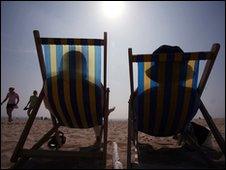Men's skin cancer death rate doubles over 30 years
- Published
The rate of men dying from the deadliest form of skin cancer has doubled over the past three decades.
Figures from Cancer Research UK show a steep increase in deaths from malignant melanoma, especially in elderly men.
In the late 1970s fewer than 400 (1.5 per 100,000) men died from melanoma but that figure has now risen to over 1,100 (3.1 per 100,000).
Yet the cancer is preventable if people avoid sunburn and deal with 'worrying' moles early, the charity said.
The death rates for women have also risen, from 1.5 to 2.2 per 100,000.

Rates have soared since the 1970s
The figures also reveal that although more women are diagnosed in the first place, more men die from the disease.
In men aged over 65 deaths have risen from 4.5 per 100,000 to 15.2 per 100,000 over the past 30 years.
Caroline Cerny, from Cancer Research UK, said men needed to learn to look after their skin.
"Too often men leave it up to their partners or mothers to remind them to use sunscreen or cover up with a shirt and hat, and even to visit the doctor about a worrying mole," she said.
Be vigilant
The figures suggest men are either not aware of skin cancer symptoms or are ignoring them and putting off going to see their GP, she added.
"It's crucial that people go to their doctor as soon as they notice any unusual changes to their skin or moles - the earlier the cancer is diagnosed the easier it will be to treat."
Care services minister Paul Burstow said that the figures were worrying and everyone needed to be vigilant.
"Seeing many people with sunburn from the recent sunny weather is a reminder of how easy it is to damage your skin," he said.
Dermatologist Dr Jonathan Bowling, from the Radcliffe Hospitals Trust and the private Cadogan clinic, said it was vital that anyone with any concerns about their moles seek help from a qualified dermatologist.
"If you are worried about a mole, go to a GP," he said.
"Either he can refer you, or if you are still worried you can ask to see a dermatologist."